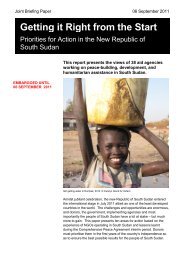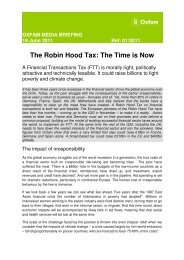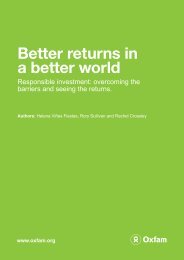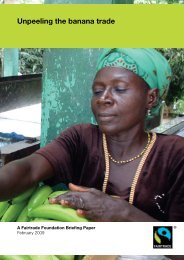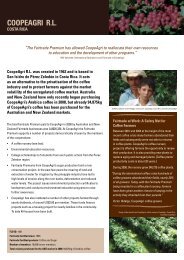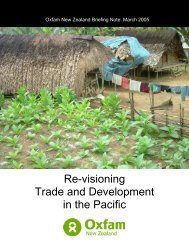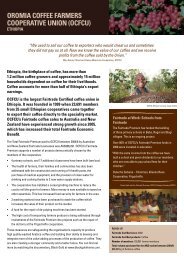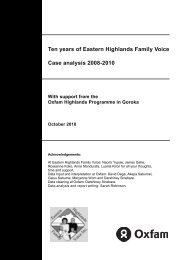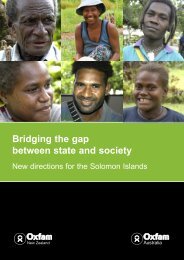Oxfam New Zealand Comments on the NZAID Pacific Strategy ...
Oxfam New Zealand Comments on the NZAID Pacific Strategy ...
Oxfam New Zealand Comments on the NZAID Pacific Strategy ...
Create successful ePaper yourself
Turn your PDF publications into a flip-book with our unique Google optimized e-Paper software.
<strong>NZAID</strong> role in <strong>Pacific</strong> land tenure reform<br />
<str<strong>on</strong>g>Oxfam</str<strong>on</strong>g> questi<strong>on</strong>s whe<strong>the</strong>r it is appropriate for <strong>NZAID</strong> to adopt a programme<br />
aims such as ‘supporting appropriate land tenure’ (para 21). The questi<strong>on</strong> of<br />
what is ‘appropriate’ is c<strong>on</strong>tentious, particularly when part of a foreign d<strong>on</strong>or<br />
strategy. The c<strong>on</strong>text is that <strong>the</strong> EU, <strong>the</strong> Australian government and o<strong>the</strong>rs<br />
have called for privatisati<strong>on</strong> of land and fewer restricti<strong>on</strong>s <strong>on</strong> ownership by<br />
foreigners. For example, <strong>the</strong> EU has included a request for greater foreign<br />
ownership of land in its requests of two <strong>Pacific</strong> nati<strong>on</strong>s under current WTO<br />
GATS negotiati<strong>on</strong>s.<br />
The inclusi<strong>on</strong> of land tenure reform in <strong>the</strong> secti<strong>on</strong> that relates to ec<strong>on</strong>omic<br />
growth indicates that <str<strong>on</strong>g>New</str<strong>on</strong>g> <str<strong>on</strong>g>Zealand</str<strong>on</strong>g>’s interests are also driven by ec<strong>on</strong>omic<br />
c<strong>on</strong>siderati<strong>on</strong>s. This is a dangerous approach, given that land is not <strong>on</strong>ly an<br />
ec<strong>on</strong>omic asset but is central to <strong>the</strong> identity of many <strong>Pacific</strong> peoples and<br />
potentially a source of bitter c<strong>on</strong>flict.<br />
The soluti<strong>on</strong> is not just to shift land tenure into ano<strong>the</strong>r secti<strong>on</strong> of <strong>the</strong> strategy,<br />
but to questi<strong>on</strong> why <strong>NZAID</strong> should be involved. It is not enough to identify that<br />
land tenure is an important issue for <strong>the</strong> <strong>Pacific</strong>. As is clear from <strong>the</strong> <strong>NZAID</strong><br />
<strong>Strategy</strong>, d<strong>on</strong>or funds are a small part of <strong>the</strong> overall funding available to PIC<br />
governments and <strong>the</strong>re need to be good reas<strong>on</strong>s why d<strong>on</strong>ors should be<br />
involved. In this area, <strong>the</strong>re are very good reas<strong>on</strong>s why d<strong>on</strong>ors should not be<br />
involved and a real questi<strong>on</strong> over <str<strong>on</strong>g>New</str<strong>on</strong>g> <str<strong>on</strong>g>Zealand</str<strong>on</strong>g>’s value added.<br />
<str<strong>on</strong>g>Oxfam</str<strong>on</strong>g> recommends that <strong>the</strong> <strong>Strategy</strong> does not include support for land<br />
tenure.<br />
The role of <strong>the</strong> <strong>Pacific</strong> Plan<br />
The <strong>Pacific</strong> Plan was agreed by <strong>the</strong> Forum leaders in Port Moresby, but is by<br />
no means a document that is widely supported or understood by <strong>Pacific</strong><br />
people. At last year’s Civil Society Forum in Port Moresby, organisati<strong>on</strong>s from<br />
across <strong>the</strong> <strong>Pacific</strong> reported that few people were even aware of <strong>the</strong> <strong>Pacific</strong><br />
Plan’s existence.<br />
The principles of good governance should require that civil society and <strong>the</strong><br />
public are involved in <strong>the</strong> preparati<strong>on</strong> of a Plan that purports to provide a<br />
roadmap for regi<strong>on</strong>al cooperati<strong>on</strong>. This is by no means <strong>the</strong> case, and <strong>Pacific</strong><br />
society has made it clear <strong>on</strong> many occasi<strong>on</strong>s that <strong>the</strong> public informati<strong>on</strong> and<br />
c<strong>on</strong>sultati<strong>on</strong>s processes in <strong>the</strong> process of preparing <strong>the</strong> <strong>Pacific</strong> Plan were<br />
woefully inadequate.<br />
Fur<strong>the</strong>r, <strong>the</strong>re are a number of provisi<strong>on</strong>s in <strong>the</strong> <strong>Pacific</strong> Plan that do not<br />
accord with <strong>NZAID</strong>’s draft strategy. For example, <strong>the</strong> secti<strong>on</strong> of ec<strong>on</strong>omic<br />
growth lacks a framework that would prioritise pro-poor growth, and instead<br />
merely talks about ec<strong>on</strong>omic growth as an aim in itself. From <str<strong>on</strong>g>Oxfam</str<strong>on</strong>g>’s<br />
analysis, <strong>the</strong> formulati<strong>on</strong> of <strong>the</strong> Plan was str<strong>on</strong>gly influenced by Australia and<br />
<str<strong>on</strong>g>New</str<strong>on</strong>g> <str<strong>on</strong>g>Zealand</str<strong>on</strong>g>, and includes a rapid and deep trade liberalisati<strong>on</strong>. The



